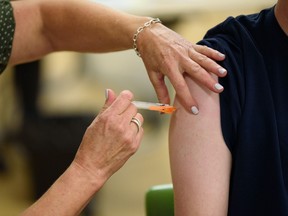
Haldimand-Norfolk board of health members are being asked to lead by example by getting their flu and COVID vaccines as the county enters the peak of respiratory virus circulation.
Advertisement 2
Article content
During late fall and into the winter months, viruses, including COVID-19, influenzas A and B and respiratory union virus (RSV) increase significantly. The peak of circulation, said Sarah Titmus, program manager of infectious disease at the Haldimand-Norfolk Health Unit, is from Nov. 1 to April 30.
“As the board of health are respected members of our community and can be advocates for this important public health initiative, staff ask that they speak positively about the benefits of immunization,” said Titmus in a report presented at Monday’s meeting of the board of health .
Respiratory diseases are a group of illnesses caused by organisms such as viruses or bacteria that affect the respiratory system.
Advertisement 3
Article content
The organisms can be spread by coughing, sneezing or face-to-face contact and include diseases such as tuberculosis and legionella to influenza and COVID-19.
In general, respiratory viruses commonly result in mild cold or flu-like symptoms, with the exception of people with risk factors, the elderly, and the very young who may experience more severe symptoms.
Those at higher risk of severe illness include people over 60; those who are immunocompromised; pregnant people; First Nations, Inuit and Metis communities; international agricultural workers living in congregational living settings; residents, staff, essential caregivers and visitors to highest risk settings; and those who aren’t vaccinated.
Advertisement 4
Article content
While Titmus said it’s difficult to predict the number of COVID-19 and influenza cases for the season, “we can make some assumptions.” She said it’s expected respiratory disease in Haldimand Norfolk will follow a similar pattern as last year with a range of 265 to 309 cases of influenza and 458 to 1,227 of COVID-19. For outbreaks in long-term care homes and other institutional settings, the health unit is expecting to see a peak in late 2024 and early 2025 with a range of 42 to 44 respiratory outbreaks.
Practices to reduce respiratory infections include:
- Stay up to date with immunizations, including flu, COVID-19 and RSV, if eligible.
- Wash your hands frequently and avoid touching your nose, eyes and mouth.
- Practice respiratory etiquette by coughing or sneezing into your upper sleeve.
- Stay home from work or school when you or your child are sick.
- Regularly clean high-touch surfaces at home and work.
- Consider wearing a tight-fitting medical mask in indoor public settings, especially if you are at higher risk of severe infection.
Article content